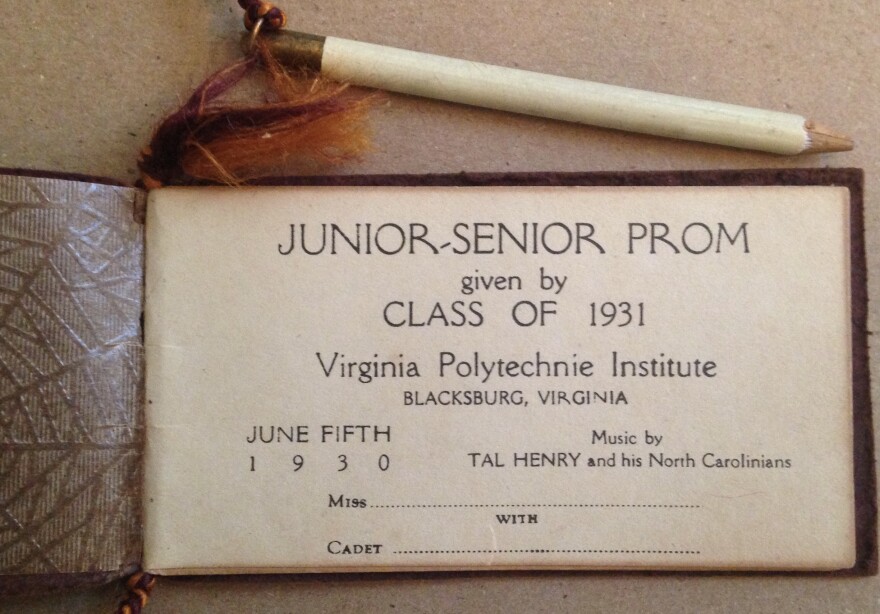What’s in the back of your closet? Or tucked away in your parents’ attic? Directors of a project to digitize Virginia history want to know. In Montgomery County Virginia, they’re putting on a kind of Antiques road show. But it’s not about getting an appraisal. The item, and your story about why it’s special, will go down in history.
“It’s Prescut…
When Samantha Parish walks into a room she immediately starts identifying the objects on display. Here’s a faux crystal glass pitcher of the kind that would have been found in many families cupboards decades ago.
“Prescut: P-R-E-S-C-U-T. It was an inexpensive version, done by Anchor Hocking, supposed to simulate cut glass.”
Parish is a former antique dealer and auctioneer, now the director of the Montgomery County Memory Project, which aims to digitize people’s cherished objects for posterity, and to "bridge gaps within the community between, not only people, but information, historical information to try and fill in what ever we can.”
A grant from the National Endowment for the Humanities for the Common Heritage Project is covering the costs of a state of the art digital scanner that will preserve objects, letters and more that people bring in. Virginia Tech is a partner on the project and Tech has an extensive digital department in its library. Amanda French directs it.
“With some of that money, we’ve trained people to do this properly, things like resolution. I mean anyone could snap a picture with their iPhone, but we’re also talking about trying to make sure that this is entered into the historical record so that people 50 years from now can still be analyzing this material when they’re writing histories."
French explains that the whole digitization quest began in the 90s but only a tiny fraction of things have been preserved in this way. People who bring their objects in for the Memory Project will not only go home again with those objects - they’ll also get a high quality picture of it to take with them.
So what to bring? What to choose? What makes something historically relevant?
“People don't always think of themselves as a part of history, but they are and their families are. So for instance, even a picture of you grandfather in his uniform or the railway station going off to war, that kind of thing. But I really think people are going to know; the thing that is most special to them from their family history. If they think its special then probably a lot of people will think it’s special.”
And it should be nothing too big that you can’t carry it into to one of the libraries where the digitization events will be held. And it must be something that has some relation to this part of southwest Virginia. Historical items are always of great interest, but it doesn’t have to be something especially old or expensive. Again Samantha Parish.
“Monetary value does not necessitate historical value. It doesn’t necessarily mean, that if you have a painting (by) Picasso –wonderful, lucky you-- but we’re not looking for that. We’re looking to shed some light. Build some bridges."
Like perhaps, to know what was it like to be a young girl in Blacksburg over a hundred years ago at a formal dance at a time when there were strict rules about whom you were going to dance with and when.
“This is a dance card from the Junior/Senior prom, from the class of 1901 at Virginia Tech. When you used to, you know, ‘fill up your dance card’ right there with a pencil. And while it’s just a little leather and paper book, the memories…when’s the next time you’re going to hold one of those?”
Samantha Parish will give a talk she calls, “Antique Speak’ on April 10th. She’ll explain how to identify objects, discuss the terms and categories and share her passion for antique collecting. And small armies of digitizers will be on hand at 2 half-day sessions, April 23rd and 3oth. They’ll take pictures, and oral histories to immortalize something you’ve been hanging onto because it says something about this part of the world and means something to you.
The Montgomery County Memory Project digitization events will be held on two dates; the first on April 23rd from 10am until 2pm in the Community Room at the Montgomery-Floyd Public Library in Christiansburg. And on April 30th in the Multipurpose Room on the ground floor of Newman Library at Virginia Tech.
Questions may be directed to the Samantha Parish Riggin, Program Director for The Montgomery Country Memory Project at 724-493-0750




